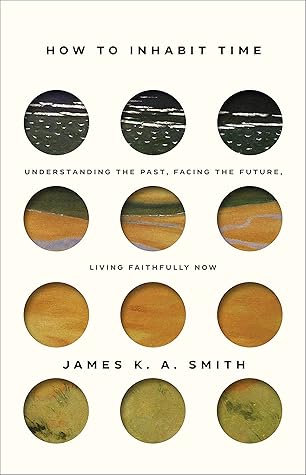More on this book
Community
Kindle Notes & Highlights
Read between
January 27 - February 6, 2025
The church’s worship, organized by the cadence of the liturgical calendar, is a calibration technology for the soul and the larger body of Christ.
Like operatives launching a mission in a spy thriller, coordinating their watches so they’re all on the same time, the people of God synchronize their soul clocks in relation to a story that cycles and repeats in the liturgical calendar.
“Because of the many pictures I have of my father, he eludes me completely. In my outrageously disloyal memory he does not exist in three dimensions, or with associated smells or timbre of voice. . . . I don’t have a memory of the man; I have a memory of a photograph.”
The penchant to capture every instant of beauty on my iPhone becomes a way of losing the world.
The result is a diminished experience of both present and past.
To be temporally aware of our creaturehood is to wear mortality comfortably.
In a vulnerable memoir in which he tries to make sense of both his doubt and the faith that won’t let him go, the poet John Terpstra often finds himself surprised not only to be in church but to long for it. “This is the only place I know where time and eternity meet on a regular basis,” he confesses. No small part of this, he says, is the singing (which, as Augustine already pointed out, is an art of ephemerality in itself). “Where else do you sing with a group of people?” he asks.
The parishioner singing out of tune, somehow, strangely, only deepens the experience.19
even our resurrection songs are sung with voices that crack and break.
Our move wasn’t bound up with the dissolution of a family. But nobody told my body; nobody informed my gut; nobody sat down with the heartbroken child I carried in my soul for whom moving meant tragedy—an ending.
The trick, Augustine says, is to learn to love what you’ll lose.
All is vapor. And yet here we are reading the ancient text of Ecclesiastes in the twenty-first century.
One of the key principles of slow food culture is seasonality. This stands in contrast to fast food culture’s fixation on availability. Fast food culture is driven by its own kind of atemporal idealism that floats above the realities of time—it contrives a “nowhen” by making everything available everywhere, all the time.1 “We have been conditioned to expect the endless bounty of summer foods through every season, even though that’s simply not how nature works.”
Sometimes what is required of us is to pass through a season of reckoning, including reckoning with our own (collective) sins and failures. To give ourselves over to such a season—to focus on what it demands—means not to rush to resolve it or escape but to endure, undergo, let go of what needs to be taken from us.
“discernment is a grace.”10 We need only to achieve the posture of receptivity to welcome
It involves striving untrammeled for all that is great, better and more beautiful, while at the same time being concerned for the little things, for each day’s responsibilities and commitments.”
“We must be willing to let go of the life we had planned,” says E. M. Forster, “so as to have the life that is waiting for us.”
To embrace seasonality is to cultivate an availability to the moment, entrusting ourselves to the Lord of history and willing to live through the mystery that is time. This requires a special kind of patience that is a willingness to not judge a zig until we’ve lived through the zag, so to speak—to wait for the season to unfold before resenting what it’s taken. Sometimes the gifts come at the end.
Trading testimonies across generations turns the communion of saints into a time machine.
Francis urges that discernment requires a kind of apprenticeship to history.
Genealogy recognizes that our present rests not on some predetermined bedrock but on “an unstable assemblage of faults, fissures, and heterogeneous layers that threaten the fragile inheritor from within or underneath.”
God’s nearness looks and feels different depending on the season you’re in.
God and God’s Word remain the same, but the place and season in which I (and we) hear it creates new resonances, new epiphanies.
My accrued experience—including suffering and trials, accomplishments and conversions—tills the soil of my reception in new ways.
One of the mysteries of time, and the histories we absorb as temporal creatures, is the way experience incubates a sort of receptivity we couldn’t plan, new avenues of openness to the world, unexpected needs that open up in our soul.
“They were so intensely good at being precisely what they were.”4
An eschatological orientation isn’t only about a future expectation but also a recalibration of our present.
An eschatology is a theology of public life, the life we share in common in the meantime.
Discernment is not a baptism of the status quo.
Eschatological expectation is essential to heavenly citizenship: as long as we’re praying “Thy kingdom come,” it’s not here yet.
Our tendency to sync to something other than God’s kingdom time makes ongoing liturgical recalibration necessary.
When you’re driving, don’t look immediately in front of you. If you’re fixated on the immediate, your driving will always be reactive, and reactive drivers are dangerous drivers. While it might seem that they are perpetually on guard, in fact they are less able to absorb what’s coming. Instead, aim high: look down the road and trust your peripheral vision. Let the way forward be guided by that longer view and you’ll actually be a better driver.
“Having enough time” is an act of hope. Building margins into a life so you can respond to opportunities to muse, play, talk, pray is its own defiant act of trust and expectation.


